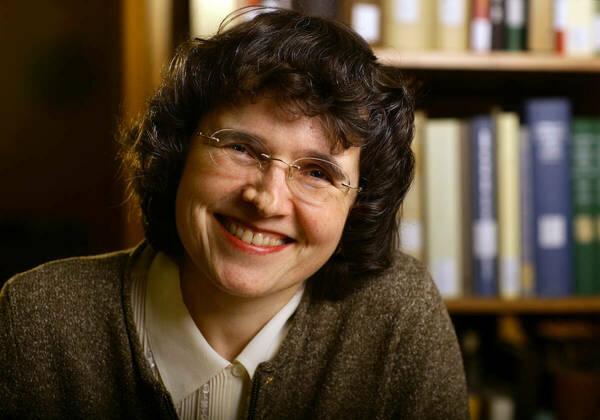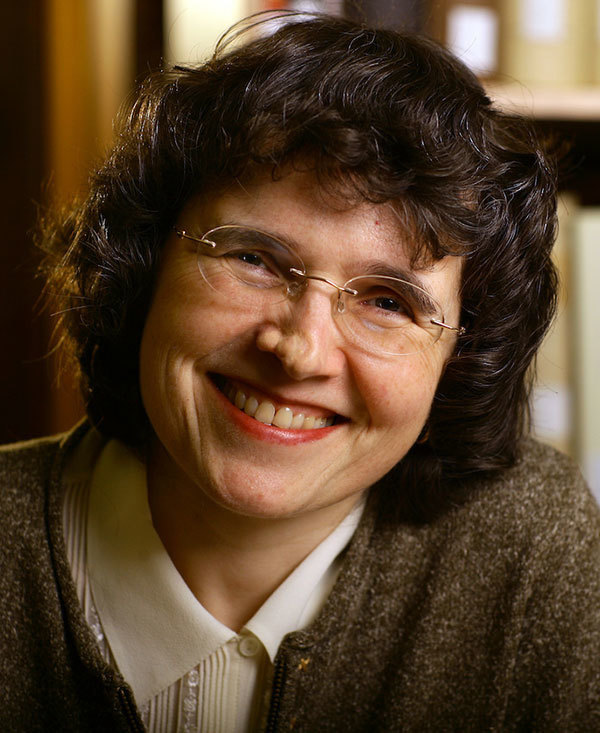
 Kathryn Kerby-Fulton
Kathryn Kerby-Fulton
Kathryn Kerby-Fulton studies medieval texts, many of them on sheepskins and fragile after hundreds of years in conditions not always suited for preservation. With so few texts surviving from the time period, the words imprinted on those skins are treasures.
While Kerby-Fulton, the Notre Dame Professor of English, is interested in what the authors of the time were sharing with their world, she’s even more interested in what their readers thought.
The margins of these medieval texts contain thoughts scrawled by some of the brightest minds of the time.
Such handwritten notes provide deep insight into how the texts were perceived and what portions readers found significant. They are a layer of interaction and understanding that Kerby-Fulton will spend the next year studying, supported by a fellowship from the American Council of Learned Societies.
The ACLS, the pre-eminent representative of American scholarship in the humanities and social sciences, conferred just 69 fellowships this year from a pool of more than 1,100 applicants.
“My work is looking especially at what readers of medieval texts thought about what they were reading, what marginalia they were writing in their manuscripts, indicating what they were thinking and how one should read these texts,” Kerby-Fulton said.
The ACLS, the preeminent representative of American scholarship in the humanities and social sciences, conferred just 69 fellowships this year from a pool of more than 1,100 applicants.
Parallel Texts
A faculty fellow in Notre Dame’s Medieval Institute, Kerby-Fulton is especially interested in medieval texts that explore the mind or human thinking.
“Just like we have acres of self-improvement books, the Middle Ages had parallel texts,” Kerby-Fulton said. “There were all different methods for understanding the self, and understanding things like moral issues and how the mind works.”
The writings were often quite complicated, and the notes made by readers—usually the leading scholars of the time, since few others had access to the texts—helped explain difficult concepts, expounded on the subject, or showed disagreements.
Readers were actually trained to give thoughtful feedback on texts, because those who understood the more complex ideas espoused had a responsibility to help others who would later read those same texts.
“Today when you borrow a library book, you’re not supposed to mark it up, but in the Middle Ages, marking up a text was seen as a public duty,” Kerby-Fulton said. “You get layers and layers of response.”
Lost Art
Though leaving personal thoughts in the margins of shared books is discouraged now, Kerby-Fulton finds it still happens—and a similar good comes from it.
“When I’m teaching, students will say to me, ‘I’m using a used book and a former student has written here that this passage by Chaucer should be interpreted this way, which is different from how we are learning it today,’” Kerby-Fulton said. “And I’ll realize that interpretation is how it was taught 20 or 30 years ago, and we can talk about how interpretations have changed over time.”
“When you read a text you’re passionate about, you often want to know what other people think about the same text. Getting that response from readers of the time and understanding it in their context is invaluable to understanding the text as it was meant.”
But the art of considered, complex discussions in the margins of books has been lost to history, Kerby-Fulton said. And with it, unfortunately, has gone many deep reflections of the self by authors themselves. Rational thought, she said, has trumped spiritual and mystical explanations for events of the mind.
“Medieval writers would connect the mind with religious experiences. They were much more likely to discuss those things,” she said. “If one has kinds of alternate experiences today, one doesn’t often rush to talk about them for fear that people think you’re crazy. One of the sadder aspects of that is a kind of loss of spontaneity in spiritual life.”
Reader Responses
Kerby-Fulton’s fellowship year will be spent drafting a book, Medieval Interiorities and Modern Readers: Recovering Medieval Reading Practices for Understanding the Self, which will focus on the complex reading habits employed at the time.
She’ll explore types of marginal annotations, different responses, and disagreements between authors and readers.
“I’m a literary scholar, and like anyone who likes to read, when you read a text you’re passionate about, you often want to know what other people think about the same text,” Kerby-Fulton said. “Getting that response from readers of the time and understanding it in their context is invaluable to understanding the text as it was meant.”
Kerby-Fulton also studies religious and political censorship, apocalypticism, visionary writing, women’s mysticism, and dance history and contemporary dance criticism. She is author or co-author of four books, including Reformist Apocalypticism and Piers Plowman (winner of the Medieval Academy of America’s John Nicholas Brown Prize) and Books Under Suspicion: Censorship and Tolerance of Revelatory Writing in Late Medieval England (winner of the Medieval Academy’s Haskins Gold Medal).
Kerby-Fulton said the opportunity to dedicate so much time to this project is something she greatly appreciates.
“The only time that any of us can get away and write a long book is when you have that kind of sustained time,” she said. “It’s a great gift and an honor.”
Originally published by Brian Wallheimer at al.nd.edu on August 24, 2016.